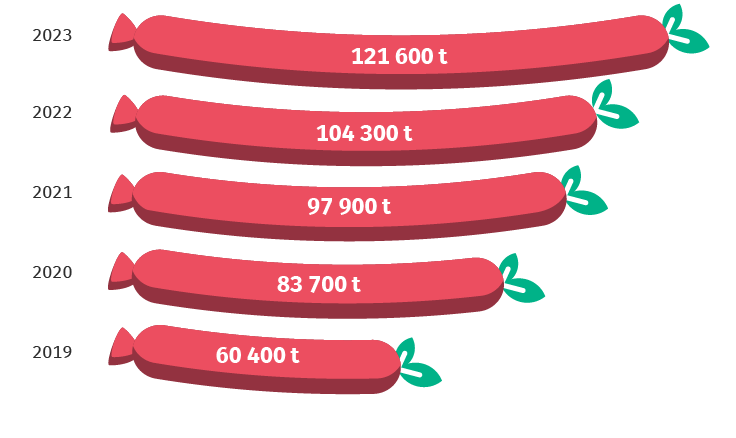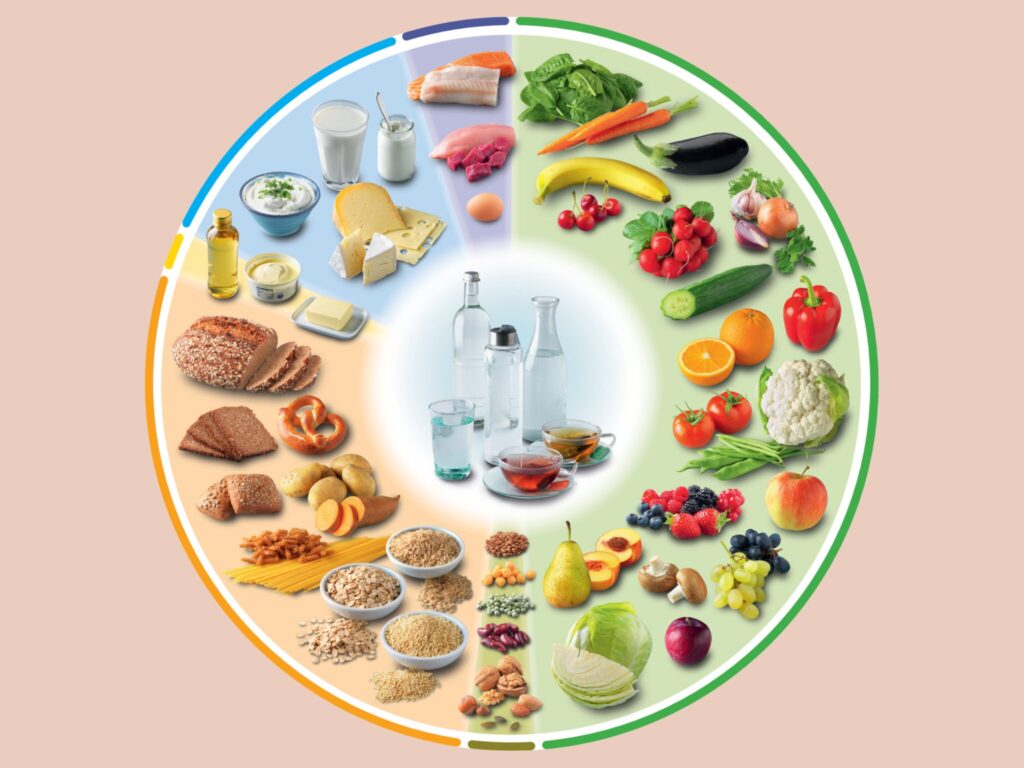4 Mins Read
Germany – Europe’s largest vegan market – produced nearly 17% more plant-based meat last year than in 2022, according to federal data.
Two months after the German Society for Nutrition updated its dietary guidelines to recommend halving meat consumption, it has emerged that the country’s annual production of plant-based meat grew by 16.6% in 2023, reaching 121,600 tonnes.
That’s according to the Federal Statistical Office (Destatis), which noted: “Whether veggie burgers, tofu sausages or seitan mortadella – the demand for vegetarian or vegan meat substitutes continues to increase.”
When looking at longer-term trends, manufacturing of meat analogues has more than doubled since pre-pandemic levels, up by 113% from 2019. The growth has been constant with each passing year, and this is an indication that the adoption of plant-based meat remains unbroken, said Destatis.
Value gap between animal- and plant-based meat shrinks
It’s not just the amount of plant-based meat that has increased – the number of companies manufacturing these products has too. In 2022, 51 businesses were making these analogues, but last year, this jumped to 67.
Moreover, the value of the plant-based meat produced in Germany also grew by 8.5% last year, going from €537.4M in 2022 to €583.2M in 2023. That said, this is still relatively low when compared to conventional meat, whose value grew by 5.6% year-on-year to reach €44.8B in 2023 – nearly 80 times higher than vegan analogues.
But while still large, this gap has shrunk in almost half since before the pandemic. In 2019, meat products produced in Germany were worth €40.1B, 150 times more than plant-based meat (around €300M). This is a marker of the latter’s growth in the country, which is the largest market for vegan food in all of Europe. Sales of plant-based products grew by 11% from 2020 to reach nearly €2B in 2022.

Meanwhile, Destatis noted that the rising demand for meat alternatives was accompanied by a continuing decrease in both production and consumption of animal-derived meat. Despite the value growth, conventional meat production has actually fallen for seven consecutive years in Germany, reducing by 4% in 2023 compared to the year before. Since 2016, it has dipped by 21%.
And preliminary data released by the Federal Institute for Agriculture and Food revealed that per capita consumption of meat had dropped by 12% compared to 2019, reaching 51.6 kg on average in 2023. Separate research backed by the EU has shown that 59% of Germans were eating less meat in 2022 than the year before.
Germany’s support for plant-based food
Germany’s increasing meat production will serve what is considered Europe’s largest flexitarian market – 55% of its population follows such a diet, according to the USDA. It has been supported by federal policies promoting plant-based foods too: the country’s latest nutrition strategy from 2022 spotlights vegan eating as one of its main focuses, particularly in government-run establishments like hospitals and schools.
The German government has also set aside €38M in its 2024 federal budget to encourage the manufacturing and consumption of alternative proteins and a switch to plant-based agriculture, as well as open a Proteins of the Future centre.
“Germany needs a roadmap for the transition towards more alternative protein sources and such a centre can be the first step in developing such a strategy with all relevant departments and stakeholders,” said Ivo Rzegotta, senior public affairs manager for Germany at industry think tank the Good Food Institute Europe.
And in March, the country’s new nutritional guidelines suggested a 50% reduction in meat, advocating for a “health-promoting and ecologically sustainable diet” that is comprised of 75% plant-based foods. . “If we want to eat a healthy diet and at the same time protect the environment, we have to change our diet now,” the nutrition society’s president, Bernhard Watzl, said at the time.

But the dietary guidelines were criticised for not highlighting the benefits of plant-based meat. The society noted that the nutrient profile of plant-based meat, seafood and dairy “often differs greatly from that of animal foods”. “Based on the usual consumption habits in Germany, the complete or partial replacement – especially of milk and fish – with plant-based alternatives without appropriate substitution can lead to nutrient deficiencies,” it said.
Writing on LinkedIn, Anna-Lena Klapp, senior nutrition and health specialist at ProVeg International, said: “Plant-based alternatives to popular animal products play an essential role for people transitioning to a more plant-based diet as these products often closely resemble the foods people are used to and like.”
She added that the guidelines should identify which plant-based products can and cannot be part of a sustainable or healthy diet: “They should differentiate between plant-based alternatives that can be consumed frequently, and those that should be eaten in moderation or seen as merely for enjoyment.”



